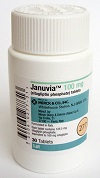
LONDON--The good news keeps rolling in for Merck ($MRK) when it comes to the cardiovascular safety of its DPP-4 diabetes drug, Januvia. According to a new analysis of the TECOS trial, patients with Type 2 diabetes and cardiovascular disease--even those with a history of heart failure--can take the drug without an increased risk of CV complications.
The new analysis--presented at the European Society of Cardiology Congress--follows June's initial presentation of TECOS, which eased heart safety worries over Merck's top seller. The trial turned up no differences in cardiovascular problems among Januvia patients and placebo patients. Those initial findings, though, were adjusted to control for baseline heart failure, leaving "some questions unanswered," study author Darren McGuire said in a statement.
Now, though, the unadjusted analysis has produced the same conclusion: There's "no signal of any sort of heart failure risk" with Januvia, McGuire said.
"It's reassuring to be able to present data from a large study over a number of years that provides more information about the safety profile," Peter Stein, Merck's VP of clinical research in diabetes and endocrinology and a member of the executive committee for the TECOS trial, told FiercePharma in an interview. " ... I think that's very important in helping (physicians) to feel comfortable about the tools they're using to get their patients to glycemic goals."
Analysts have been enthusiastic about the TECOS data since Merck first previewed the trial results, with Leerink Partners analyst Seamus Fernandez in April predicting the findings could take Januvia's 2017 sales to $6.4 billion.
They've also set Januvia apart from a pair of DPP-4 rivals, AstraZeneca's ($AZN) Onglyza and Takeda's Nesina, both of which have posted recent trial results suggesting an increased risk of heart failure hospitalizations. In April, an FDA panel recommended the AZ med's label include information about that risk.
The way TECOS investigator Paul Armstrong sees it, though, there are plenty of differences between TECOS and the Onglyza and Nesina studies--dubbed SAVOR and EXAMINE, respectively--that could have hurt those drugs' safety reps compared with Januvia's. Differences in the patients enrolled and their background care; variation in the trials' definition of heart failure events; and even the play of chance could have all factored in, he told reporters at a press briefing.
"There are intrinsic pharmacologic differences," in the DPP-4 players, he said, though "whether these might play out and produce a different outcome I think is a matter of speculation."
Meanwhile, though, partners Eli Lilly ($LLY) and Boehringer Ingelheim just announced that their SGLT2 newcomer, Jardiance, had become the first diabetes treatment to show it could lower the risk of heart attack, stroke and death from cardiovascular causes. And if those data prove valid, Armstrong said, it could spur changes to diabetes treatment guidelines--meaning bad news for Januvia and its peers.
"DPP-4s are generally well-tolerated, neutral on weight and have for the most part been viewed as safe," Evercore ISI analyst Mark Schoenebaum said in a note earlier this month. But they've "failed to demonstrate a CV outcomes benefit. After today, given the CV benefit from at least one SGLT2 inhibitor, Jardiance, we expect doctors will be more eager to prescribe SGLT2s in front of DPP-4s," he wrote.
The way Stein sees it, though, there's room on the diabetes market for both. Doctors often use combinations to treat the disease, he pointed out, and "the more tools we have to manage diabetes, the better," he said.
- read the release
Special Reports: Top 15 pharma companies by 2014 revenue - Merck - AstraZeneca | Top 10 best-selling diabetes drugs of 2013